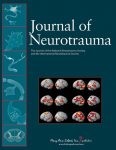
Snell, D.L., Siegert, R.J., Debert, C., Cairncross, M., Silverberg, N.D. (2020). Evaluation of the Fear Avoidance Behaviour after Traumatic Brain Injury questionnaire. Journal of Neurotrauma. doi: 10.1089/neu.2019.6729.
Abstract
Fear avoidance behavior is related to symptom persistence and disability in various health conditions, such as chronic pain. Fear avoidance behavior also may impact recovery from mild traumatic brain injury (mTBI), but no measure of this construct has been psychometrically validated for the mTBI population. Adults who sustained an mTBI (n = 159) were recruited from three outpatient mTBI clinics. Participants completed the new Fear Avoidance Behavior after Traumatic Brain Injury Questionnaire (FAB-TBI). The FAB-TBI includes 16 items drawn from well-established fear avoidance scales, primarily in the chronic pain literature. An exploratory factor analysis and Rasch analysis were conducted to evaluate the factor structure, dimensionality, and differential item functioning of the FAB-TBI. The FAB-TBI scale was found to have strong internal consistency (Cronbach’s α = 0.9). Exploratory factor analysis suggested at least two distinct factors (activity avoidance and cogniphobia). Initial fit to the Rasch model was adequate, with one misfitting item. The model was not improved after removing the misfitting item. Best fit to the unidimensional Rasch model was achieved after items were combined into three super items based on exploratory factor analysis and retaining the misfitting item 12 (χ2 (6, n = 159) = 2.1, p = 0.06). The FAB-TBI appears to be a psychometrically sound measure of fear avoidance behavior after mTBI. Conversion tables are made available to convert scores into interval-level data for future research.
Article: Journal of Neurotrauma
Follow this link for more of our Publications
